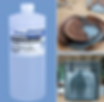What’s the Difference Between Epoxy, Polyester, and Vinyl Ester Resins?
- michaelasy500
- Jul 2, 2025
- 2 min read
Updated: Jul 3, 2025
When choosing a resin for your project, it’s essential to understand the differences. Epoxy, polyester, and vinyl ester resins each have unique advantages. Whether you’re in construction, boat building, or crafting, the right resin matters.
Understanding Epoxy Resin and Its Strength and Versatility
Epoxy resin is known for its superior mechanical properties. It provides excellent bonding strength and durability. Many industries rely on epoxy resin Philippines suppliers for quality output in applications like coatings, adhesives, and laminates.

This type of resin resists moisture and chemicals better than others. It cures slower, but that results in a tougher, longer-lasting finish. Whether used in flooring or art, epoxy provides unmatched adhesion.
Another major benefit is low shrinkage. It keeps parts dimensionally stable, which is vital in precision-based projects. From aerospace to DIY crafts, epoxy stands out.
Fiberglass Polyester Resin - Affordable and Fast-Curing
Fiberglass polyester resin is the most commonly used resin in general applications. It is ideal for boat repairs, fiberglass molds, and low-cost composite projects. It cures faster than epoxy, saving time on large projects.

This resin is also more affordable. For those on a budget, polyester resins offer a practical alternative. However, it does have higher shrinkage and lower bonding strength.

It's not as chemical-resistant as epoxy. When exposed to harsh conditions, it may wear faster. However, polyester resin delivers well for temporary builds or non-critical items.
Vinyl Ester Resin and Its Toughness for Harsh Environments
Vinyl ester resin is a hybrid between epoxy and polyester. It offers the best of both worlds. It features improved chemical resistance, much like epoxy, but with the ease of use of polyester.

Many industries are switching to high-strength vinyl ester in the Philippines for marine and industrial applications. Its molecular structure allows it to resist cracking under stress, especially in corrosive environments.

Vinyl ester bonds well and has a flexible nature. It resists fatigue better, making it ideal for high-impact use. If your project requires strength under tough conditions, vinyl ester is a smart choice.
Each resin suits a specific purpose. Epoxy resin is great for heavy-duty projects. Fiberglass polyester resin works for general repairs. Vinyl ester resin stands firm in chemical-prone settings.
Choosing the Right Resin for Your Needs
When selecting resin, consider your priorities. Do you need strength, cost savings, or chemical resistance?
Use epoxy resin Philippines products for high-end builds or when moisture and bonding are concerns.
Choose polyester resins for large-scale, low-cost projects like fiberglass body parts or tanks.
Pick high-strength vinyl ester for corrosion-prone applications such as boats or storage tanks.
Don’t forget environmental factors. The Philippines' humid and salt-laden air can break down materials fast. That’s why investing in the correct resin type can extend your project’s life.
Every resin has a role to play. Understanding their differences helps you make smart choices. Whether you're a builder, engineer, or crafter, match the resin to the need.
Epoxy resin remains the gold standard for top-tier projects. Fiberglass polyester resin is efficient for affordable, quick fixes. And vinyl ester resin shines for anything in between—especially where durability is key.

